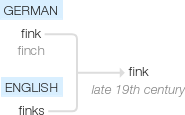Fink
late 19th century: of unknown origin; perhaps from German, literally ‘finch’, but also a pejorative term. Students started to refer to non-members of fraternities as finks, probably by association with the freedom of wild birds as opposed to caged ones. The term was later generalized to denote those not belonging to organizations such as trade unions.
wiktionary
Unknown. First attested in 1894. [1] A connection to Yiddish as some propose is unlikely. [2]
fink (third-person singular simple present finks, present participle fought, simple past and past participle fought)
From Afrikaans vink
etymonline
fink (n.)
1902, of uncertain origin, possibly from German Fink "a frivolous or dissolute person," originally "a finch" (see finch); the German word also had a sense of "informer" (compare stool pigeon). The other theory traces it to Pinks, short for Pinkerton agents, the private police force hired to break up the 1892 Homestead strike. As a verb, 1925 in American English slang. Related: Finked; finking.
